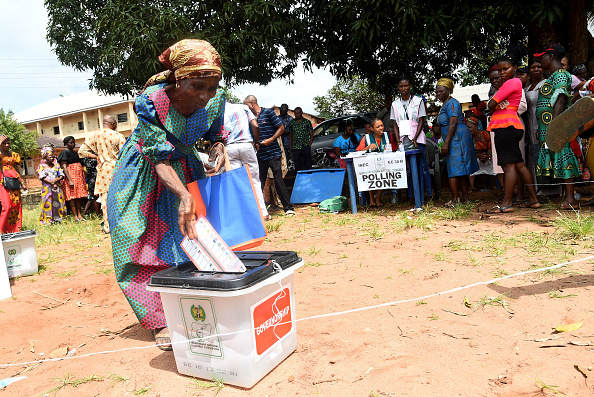Lagos – A former central bank governor won a key election in southeast Nigeria, results showed on Wednesday, beating President Muhammadu Buhari’s ruling APC party candidate in a ballot seen as a test ahead of the 2023 presidential race.
Saturday’s governorship vote in Anambra state, where separatist militants threatened attacks and protests, was a warm-up for the electoral authorities’ readiness before the national vote in less than 18 months.
Charles Chukwuma Soludo, an economics professor running with the Anambra powerhouse party All Progressives Grand Alliance or APGA, won most of the ballots, according to the Independent National Electoral Commission or INEC.
Soludo, whose APGA party has governed Anambra for 16 years, won more than 112,200 votes or more than double his APC rival and senator Andy Uba, INEC said.
“Our people have spoken overwhelmingly,” Soludo said in a victory speech, calling on his opponents to accept the result and work together.
ALSO READ | Glitches hit Nigeria southeast election
“The ultimate winner is the Anambra people.”
Buhari congratulated Soludo on his victory, urging him to tackle challenges facing the state and the southeast.
More than 30 000 police and troops were sent to Anambra, part of the southeast where the Indigenous People of Biafra or IPOB movement agitates for an independent state for the local Igbo people.
IPOB has been blamed for a string of attacks on police and government offices this year, though the outlawed group has denied responsibility.
Beyond separatist agitation, Nigeria faces other security challenges before the 2023 vote, including criminal gangs carrying out mass kidnappings in the northwest and a long-running jihadist insurgency in the northeast.
Anambra’s election went ahead mostly without incident on Saturday, but one district was unable to hold voting because of security threats.
That district, Ihiala, held its vote on Tuesday, delaying the final results announcement until Wednesday.
ALSO READ | Nigeria counts votes in key state election
Saturday’s vote was also hit by technical glitches of face and fingerprint recognition technology meant to improve accreditation. That created delays and forced INEC to extend voting in some Anambra districts.
Elections in Nigeria have often been marred by fraud claims and violence since Africa’s most populous country returned to democracy in 1999 after military rule.
INEC faced criticism during the 2019 election when it was forced to delay the vote by a week over logistical problems.
SBM Intelligence risk consultancy head of research Ikemesit Effiong said some of the factors that could have made Anambra more confrontational did not come into play.
IPOB had called off a planned protest just before the voting began.
ALSO READ | Security threats hamper key Nigeria state ballot
“Some things didn’t go according to plan but a lot happened in the positive column and Anambra turned out to not be bad after all,” Effiong said.
But voter turnout was poor even by Nigeria’s low standards, at an estimated 10 percent, according to SBM estimates based on returns against registered voters.
INEC has yet to give any official figure for voter turnout.
Soludo may still face a legal challenge from rivals, but the loss will be a blow to the ruling APC, which had sought to consolidate its position in the southeast in the runup to 2023.
The APC controls two of the five states in the region – won through a court case and the defection of one governor to its ranks. Nigeria has 36 states and the federal capital territory, Abuja.
Follow African Insider on Facebook, Twitter and Instagram
Picture: Getty Images
Source: AFP
For more African news, visit Africaninsider.com


